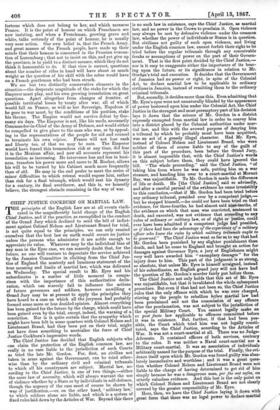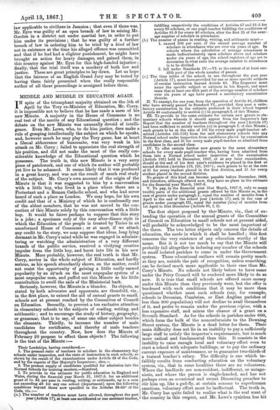OHIEF JUSTICE COCKBURN ON MARTIAL LAW.
liffEprinciples of the English Law are at all events vindi- cated in the magnificently lucid charge of the English
• Chief Justice, and if the practice, as exemplified in the conduct of the Grand Jury which declined to send the bill of indict- ment against Colonel Nelson and Lieutenant Brand for trial, is not quite equal to the principles, we can only remind ourselves that the best law on earth would secure no justice unless the persons who administer it are noble enough to appreciate its value. Whatever may be the individual bias of any man in the Eyre case, we can scarcely doubt that, for the future, no one will venture to depreciate the service achieved by the Jamaica Committee in eliciting from the Chief Jus- tice of England the masterly and luminous statement of the true meaning and limits of martial law, which was delivered on Wednesday. The special result to Mr. Eyre and his subordinates is a matter of little moment in compa- rison with the importance of this authoritative decla- ration, which can scarcely fail to influence the actions of future governors and soldiers, however unwilling a Grand Jury may be at present to apply the principles they have heard to a case on which all the jurymen had probably formed some more or less decided opinion. Almost everything has been gained for the future by the charge, which could have been gained even by the trial, except, indeed, the warning of a conviction. Nor is it quite certain that the sympathy which might have been felt in some quarters with Colonel Nelson and lieutenant Brand, had they been put on their trial, might not have done something to neutralize the force of Chief Justice Cockburn's impressive words. The Chief Justice has 'decided that English subjects who can claim the protection of the English common law, are really in no case liable to the jurisdiction of such Courts as tried the late Mr. Gordon. For, first, no civilian not taken in arms against the Government, can be tried other- wise than by the ordinary civil and criminal tribunals to which all his countrymen are subject. Martial law, ac- cording to the Chief Justice, is one of two things,—either the mere law of necessity, which will always warrant the use of violence whether by a State or by individuals in self-defence, though the urgency of the case must of course be shown by way of justification,—or, on the other hand, military law,' to which soldiers alone are liable, and which is a system of fixed rules laid down by the Articles of War. Beyond this there is no such law in existence, says the Chief Justice, as martial law, and no power in the Crown to proclaim it. Open violence may always be met by defensive violence under the common law, whether the power of individuals or States is in question. But civilians not guilty of such open violence, and living under the English common law, cannot forfeit their right to be tried before the regular tribunals through any conceivable freaks or assumptions of power on the part of their Govern- ment. That is the first point decided by the Chief Justice,— nor is it easy to exaggerate either the importance of its bear- ing upon the future, or its significance in relation to Mr. Gorden's trial and execution. It decides that the Government of Jamaica had no power or right, in spite of the Colonial Act, to declare martial law to be applicable to ordinary civilians in Jamaica, instead of remitting them to the ordinary criminal tribunals.
But, secondly, it decides more than this. Even admitting that Mr. Eyre's eyes were not unnaturally blinded by the appearance of power bestowed upon him under the Colonial Act, the Chief Justice in the strongest and most peremptory part of his decisioh lays it down that the seizure of Mr. Gordon in a district expressly exempted from martial law in order -to convey him into a district placed by the Colonial authorities under mar- tial law, and this with the avowed purpose of denying him a tribunal by which he probably must have been acquitted, was an act of a grossly illegal character. Had Mr. Eyre, instead of Colonel Nelson and Lieutenant Brand, who were neither of them of course liable to any of the guilt of this part of the procedure, been before the Grand Jury, it is almost impossible that, with the Chief Justice's words on this subject before them, they could have ignored the bill. "The whole proceeding," said the Chief Justice, "of taking him from where he was safe, putting him on a war steamer, and handing him over to a court-martial at Morant Bay, was unjustifiable. To Mr. Gordon it made the difference of life or death. He [the Chief Justice] said so advisedly, and after a careful perusal of the evidence he came irresistibly to this conclusion,—that if Mr. Gordon had been tried before any ordinary tribunal, presided over by a competent judge,--. but he stopped himself, —he could not have been tried on that evidence, for three-fourths, he had almost said nine-tenths, of the evidence on which that man was convieted, sentenced to death, and executed, was not evidence that according to any rules of ordinary or military law, or of right or justice, could ever have been admitted if a competent judge had presided, or if there had been the advantage of the experience-of a military officer who knew the rules by which military tribunals ought to be governed." The Chief Justice went so far aft to say that had Mr. Gordon been punished by any slighter punishment than death, and had he come to England and brought an action for damages against Governor Eyre, a jury of Englishmen might very well have awarded him "exemplary damages" for the injury done to him. This part of the judgment is so strong, so absolute, that unless Mr. Eyre is himself arraigned, instead of his subordinates, an English grand jury will not have had the question of Mr. Gordon's murder fairly put before them. The Chief Justice not only holds that this act of Mr. Eyre was unjustifiable, but that it invalidated the whale subsequent procedure. But even if that had not been so, the Chief Justice rules that the only offence with which he was ever charged, stirring up the people to rebellion before martial law had been proclaimed and not the commission of any offence after the proclamation, was not subject to the jurisdiction of the special Military Court. You cannot legally make an ex post facto law applicable to offences committed before it was in existence. But, further, if that had been pos- sible, the Court which tried him was not legally consti- tuted, says the Chief Justice, according to the Articles of War. It was not a court-martial at all. There was no Judge. Advocate. It contained officers of both services, contrary to the rules. It was neither a Naval court-martial nor a Military court-martial. It was an association of individuals arbitrarily named for the purpose of the trial Finally, the evi- dence itself upon which Mr. Gordon was found guilty was abso- lutely inconclusive and worthless ; and it was a great ques- tion whether Colonel Nelson and Lieutenant Brand were not liable to the charge of having determined to get rid of him simply because he was a dangerous man, per fas aut nefas, on utterly valueless evidence. And this last is the only point on which Colonel Nelson and Lieutenant Brand are not clearly covered by the greater responsibility of Mr. Eyre. • Here, then, we have the Chief Justice laying , it down with great force that there was no legal power to declara martial law applicable to civilians in Jamaica ; that even if there was, Mr. Eyre was guilty of an open breach of law in seizing Mr. Gordon in a district not under martial law, in order to put him under its provisions ; that he was guilty of a further breach of law in ordering him to be tried by a kind of law not in existence at the time his alleged offence was committed and that if he had had a slighter punishment, he might have brought an action for heavy damages, and gained them, in this country against Mr. Eyre for this high-handed injustice ; finally, that the trial itself was a mockery of both law and justice. These are great principles to lay down. Let us hope that the fairness of an English Grand Jury may be tested by having them fairly presented when the really responsible author of all these proceedings is arraigned before them.































 Previous page
Previous page